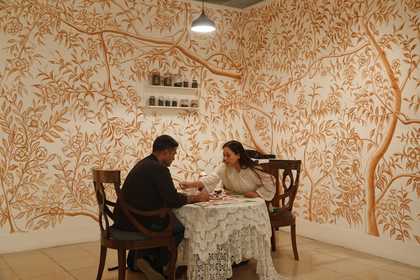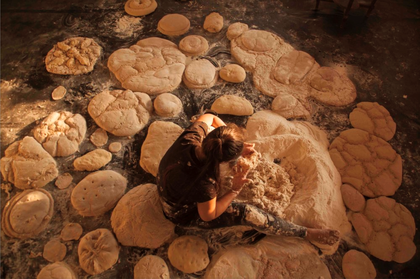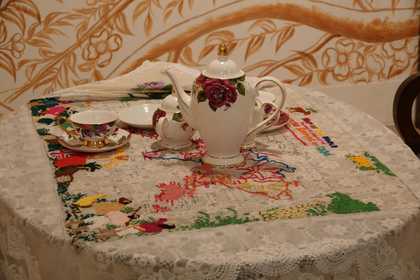Let Me Get You a Nice Cup of Tea 2019–20 is an installation and performance by Bangladeshi artist Yasmin Jahan Nupur (b. 1979). For ten days during the display, the artist holds one-to-one conversations with visitors while offering them a cup of tea which she has grown and prepared herself. Each conversation lasts around 20 minutes.
Nupur invites visitors into a cosy domestic space, yet its colonial-era style evokes the histories of violence in the region. The tablecloth is embroidered with an 1886 map of the British Empire. The napkins are stitched with opium flowers, a crop that farmers were forced to grow by the British East India Company, often for no profit. The artist herself wears a costume combining traditional Bangladeshi and British elements. On the walls are images of tea bushes, applied with a mixture of sugar and tea. For Nupur, this is a reminder that the European custom of adding milk and sugar is an adulteration of Asian tea-drinking customs. While emphasising the comforting role of tea- drinking in Britain and South Asia, the work invites us to reflect on the impact of British imperialism and colonialism.
This work was developed through a residency at the Peabody Essex Museum in association with Dhaka Art Summit, and it was acquired for ∞’≤π≥Ÿ±‚Äôs collection in 2020 with funding provided by ∞’≤π≥Ÿ±‚Äôs South Asia Acquisitions Committee. It will remain on view at ∫⁄¡œ…Á as an installation until autumn 2023.
Yasmin Jahan Nupur is taking part in a free all-day conference entitled Fugitive Forms: Performance in South Asia taking place in the Starr Cinema at ∫⁄¡œ…Á on¬Ý 22 Oct 2022. The event explores the history of performance art and its relationship to forms of protest across South Asia.
Research supported by Hyundai Tate Research Centre: Transnational in partnership with Hyundai Motor.



